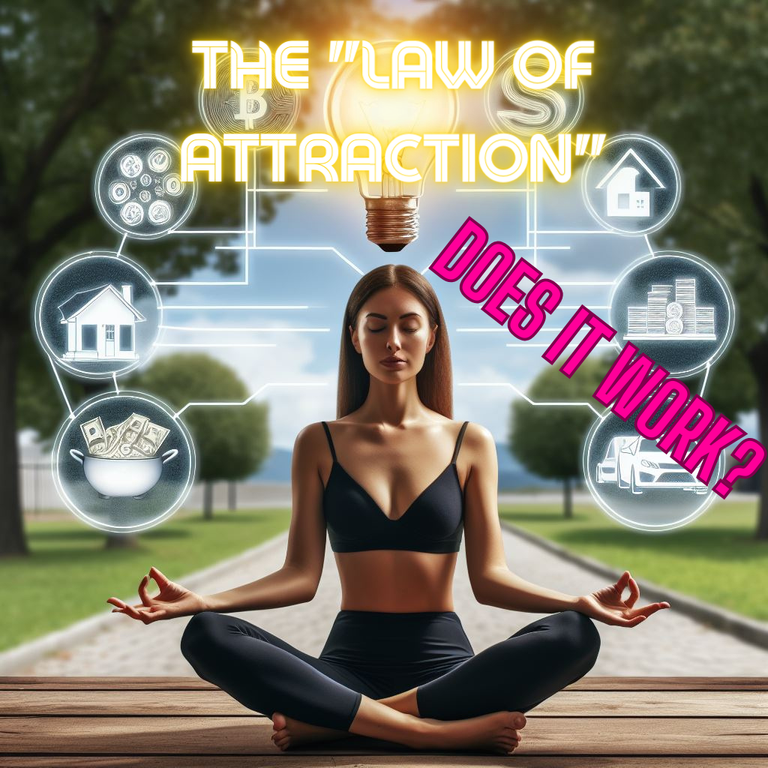Hablemos sobre la «ley de atracción», ¿funciona o no? | Let's talk about the "law of attraction", does it work or not? [ES/EN]

Es casi imposible haber llegado al día de hoy sin haber escuchado siquiera una vez sobre la susodicha «ley de atracción». Dicha ley se ha vuelto muy popular gracias al libro y el movimiento de The Secret de Rhonda Byrne, tanto así que tiende a ser referida en el ámbito de la autoayuda y ha generado mucho debate en redes sociales, donde los usuarios aseguran que se trata de un modo de vida eficaz para conseguir nuestros sueños y metas personales. Es así que no en pocas ocasiones se comparten consejos y tips para llevar a cabo estas enseñanzas e incluirlas en nuestros hábitos diarios. Todo ello como parte de una positividad que, si bien carente de evidencia científica que la respalde, constituye una forma de enajenarnos de la realidad, rehuir los verdaderos problemas y retos que nos impone la vida en la consecución de nuestras metas, y por consiguiente, llevarnos directamente a la frustración.
Pero si es el caso de que no conoces de qué va esta llamada «ley», te puedo decir que, en resumen, se trata de una creencia según la cual los pensamientos y sentimientos positivos o negativos atraen experiencias similares en la vida. Afirma que al enfocar nuestra energía en pensamientos positivos, atraeremos circunstancias y resultados favorables, mientras que los pensamientos negativos atraerían resultados desfavorables. Sus defensores suelen sostener que la atracción se produce a través de una «frecuencia de energía» o «vibración» que atrae experiencias similares. Afirman que el universo entero funciona según este principio y que podemos aprovecharlo para atraer riqueza, amor, éxito y felicidad.
Sin embargo, como ya decía anteriormente, se trata de un constructo teórico sin ningún basamento científico que lo respalde, por lo que se puede considerar incluso pseudocientífico. ¿Qué significa que sea pseudocientífico?, pues algo pseudocientífico se refiere a teorías, métodos u opiniones que afirman ser científicos, pero que en realidad no cumplen con los estándares metodológicos y éticos de la investigación científica. Estas ideas pueden carecer de evidencia empírica, basarse en falacias lógicas, o ser inconsistentes con el conocimiento científico establecido. La ley de atracción es considerada pseudocientífica porque carece de evidencia empírica y no sigue los métodos científicos aceptados.
En este sentido, si vamos a la física sin la necesidad de ser físicos o tener conocimientos avanzados sobre esta disciplina, desde los primeros grados en la escuela nos enseñan que los imanes son objetos que tienen dos polaridades: positivo y negativo. Los polos iguales se repelen entre sí, mientras que los polos opuestos se atraen. Por lo tanto, un polo positivo no atrae a otro polo positivo, sino que se repelen. Esta es una ley fundamental de la física y se aplica a todos los imanes. La ley de atracción de la que hablamos antes no está relacionada con la física y no se aplica a las interacciones entre objetos físicos, puesto que suponiendo que esta ley funcionara, si tuviésemos pensamientos o intenciones positivas, lo lógico y esperado sería que lo que atrajésemos fueran elementos negativos.
Pero no lo reduzcamos tan al absurdo, sino que vamos más hacia las ciencias del comportamiento. Esta ley simplifica enormemente los procesos que se llevan a cabo en la vida y que relacionan los pensamientos e intenciones con las experiencias, al establecer una linealidad entre pensamiento y consecuencia, como si no hubiesen factores que mediaran dicha relación. Factores que van desde el propio contexto de relaciones materiales y humanas, como tomas de decisiones, recursos, oportunidades, características sociodemográficas como la raza, el género, la clase o la edad, etc.
Por otro lado y siguiendo esta lógica, esta ley no explica por qué aunque varias personas tengan pensamientos positivos, no todas obtengan resultados iguales de positivos, y viceversa. O sea, no tiene consistencia porque no establece una generalidad que conlleve a un resultado determinado al contar con condiciones específicas para ello. De igual forma, la ley de atracción no establece cómo determinar cuándo un pensamiento es positivo o negativo, ni tiene cómo medirlo. Sabemos que se trata de algo muy subjetivo que varía de persona a persona, por lo que lo que es positivo para mí, puede que no lo sea para otra persona.

Todo en la vida es un proceso y nada se obtiene por emitir un simple pensamiento «positivo». Que tengas una idea fija no significa que necesariamente vas a conseguir lo que te propones, si no moviliza tu comportamiento, y es ahí donde se pierde el valor de esta ley. Nuestros logros y metas antes de ser alcanzados, tienen que ser primero proyectos futuros, y esto implica una temporalidad, una estrategia estructurada o no, y por supuesto, una meta específica que puede cambiar a medida que cambian nuestras vivencias.
Por otra parte, hay algo subyacente a esta ley, y es el hecho de que nos lleva a un falso estado positivo todo el tiempo con tal de conseguir un fin. Si bien una actitud positiva y resiliente ante ciertos eventos de la vida es necesaria, pretender todo el tiempo tener pensamientos positivos en la mente es un espejismo que busca taponar de alguna forma el sufrimiento y la falta inherente a la vida misma. A día de hoy nuestra sociedad busca dejar de lidiar tanto con el sufrimiento propio como ajeno pretendiendo que por ignorarlo va a dejar de existir, y es así que constantemente se aprovechan de esta estrategia para vendernos montones de bienes de consumo que prometen una «felicidad» inexistente, porque lo que no se maneja conscientemente siempre sale en muchas otras formas y terminamos por enfermarnos; enfermarnos de la cultura, pero eso es ya otro tema para otro artículo. Lo cierto es que, de ello se desprende que hablar de la ley de atracción venda bien, pues en estos tiempos agitados las personas buscan soluciones lo más rápidas y eficaces posibles, y compran lo que sea que les de un atisbo de esperanza.

Y eso es todo por ahora. Sé que tienes tus consideraciones al respecto, así que déjame conocer tu opinión y no te olvides de mostrarme tu apoyo si te gustó mi publicación. Nos vemos en Hive.
English version

It's almost impossible to have made it to the present day without having heard of the so-called "law of attraction" even once. This law has become very popular thanks to Rhonda Byrne's book and movement The Secret, so much so that it tends to be referred to in the self-help field and has generated a lot of debate on social networks, where users claim that it is an effective way of life to achieve our dreams and personal goals. So it is not infrequently that tips and tips are shared to carry out these teachings and include them in our daily habits. All of this as part of a positivity that, although lacking scientific evidence to back it up, is a way of alienating ourselves from reality, avoiding the real problems and challenges that life imposes on us in the pursuit of our goals, and therefore, leading us directly to frustration.
But if you don't know what this so-called "law" is all about, I can tell you that, in a nutshell, it is a belief that positive or negative thoughts and feelings attract similar experiences in life. It states that by focusing our energy on positive thoughts, we will attract favourable circumstances and outcomes, while negative thoughts will attract unfavourable outcomes. Proponents often argue that attraction occurs through an "energy frequency" or "vibration" that attracts similar experiences. They claim that the entire universe works on this principle and that we can harness it to attract wealth, love, success and happiness.
However, as I said earlier, this is a theoretical construct without any scientific basis to back it up, so it can even be considered pseudoscientific. What does pseudoscientific mean, because pseudoscientific refers to theories, methods or opinions that claim to be scientific, but in reality do not meet the methodological and ethical standards of scientific research. These ideas may lack empirical evidence, be based on logical fallacies, or be inconsistent with established scientific knowledge. The law of attraction is considered pseudoscientific because it lacks empirical evidence and does not follow accepted scientific methods.
In this sense, if we go to physics without the need to be physicists or have advanced knowledge about this discipline, from the first grades in school we are taught that magnets are objects that have two polarities: positive and negative. Equal poles repel each other, while opposite poles attract. Therefore, a positive pole does not attract a positive pole, they repel each other. This is a fundamental law of physics and applies to all magnets. The law of attraction we talked about earlier is not related to physics and does not apply to interactions between physical objects, since assuming this law worked, if we had positive thoughts or intentions, it would be logical and expected that what we would attract would be negative elements.
But let's not reduce it so far to absurdity, but let's go more towards behavioural science. This law greatly simplifies the processes in life that relate thoughts and intentions to experiences by establishing a linearity between thought and consequence, as if there were no factors that mediate this relationship. Factors ranging from the context of material and human relationships, such as decision-making, resources, opportunities, socio-demographic characteristics such as race, gender, class or age, etc.
On the other hand, and following this logic, this law does not explain why, even if several people have positive thoughts, not all of them obtain equally positive results, and vice versa. In other words, it has no consistency because it does not establish a generality that leads to a certain result by having specific conditions for it. Similarly, the law of attraction does not establish how to determine when a thought is positive or negative, nor does it have a way to measure it. We know that it is very subjective and varies from person to person, so what is positive for me may not be positive for someone else.

Everything in life is a process and nothing is obtained by simply having a "positive" thought. Just because you have a fixed idea does not mean that you will necessarily achieve what you set out to achieve, if it does not mobilise your behaviour, and that is where the value of this law is lost. Our achievements and goals have to be future projects first, and this implies a temporality, a structured or unstructured strategy, and of course, a specific goal that can change as our experiences change.
On the other hand, there is something underlying this law, and that is the fact that it drives us into a false positive state all the time in order to achieve an end. While a positive and resilient attitude towards certain events in life is necessary, pretending to have positive thoughts in one's mind all the time is a mirage that seeks to somehow cover up the suffering and lack inherent in life itself. Today our society seeks to stop dealing with its own suffering as well as that of others, pretending that by ignoring it it will cease to exist, and so they constantly take advantage of this strategy to sell us lots of consumer goods that promise a non-existent "happiness", because what is not handled consciously always comes out in many other forms and we end up getting sick; sick of culture, but that is another topic for another article. What is certain is that talking about the law of attraction sells well, because in these troubled times people are looking for solutions as quickly and effectively as possible, and they buy whatever gives them a glimmer of hope.

And that's all for now. I know you have your thoughts on this, so let me know what you think and don't forget to show me your support if you liked my post. See you at Hive.

Créditos | Credits
Imágenes utilizadas | Images used
Todas las imágenes utilizadas son de mi propiedad y fueron generadas utilizando la IA de Bing Image Creator y editadas en Canva | All images used are my own property and were generated using Bing Image Creator AI and were edited using Canva.
Traducción | Translation
Te puede interesar | You may be interested in
Juventud conectada: forjando identidades | Connected youth: forging identities [ES/EN]
Año nuevo, mismas frustraciones | New year, same frustrations. [ES/EN]
¿Feliz navidad o feliz Saturnalia? | Merry Christmas or Happy Saturnalia? [ES/EN]
Quererse a uno mismo, pero a qué precio | Loving yourself, but at what price [ES/EN]
Sígueme en mis redes sociales | Follow me on my social media platforms
|X|
|LinkedIn|
I do not agree that the law of attraction is all fluff. In my opinion it is up to the individuals interpretation. This topic is nothing new. It goes back to philosophy and forward to the new thought movement of the mid 1800's to the early 1900's. You can find such philosophies in writers Like Wallace D Wattles, Florence Schovel Schinn, and Napoleon Hill to name a few authors. Today authors Like Wayne Dyer and Eckhart Tolle are tops when this subject comes up. So in my opinion there is scientific evidence to back this up.
Evidencia científica no es solamente literatura que hable sobre el tema, sino un estudio sistematizado bajo ciertas pautas rigurosas. Si nos fijamos, todos esos autores que menciona a excepción de Eckhart Tolle (quien a pesar de tener estudios en filosofía y psicología es ampliamente criticado por su pensamiento simplista), son escritores sobre temas de autoayuda y espiritualidad que, si bien repercuten efímeramente en la emocionalidad de las personas, no tienen basamento sólido.
Es ampliamente conocido que los temas de autoayuda son harto comerciales porque dicen lo que la gente quiere oír, pero no lo que realmente necesitan en beneficio de sus vidas. Cada cual decide en qué creer y eso no es cuestionable, pero una cosa es creer consciente y racionalmente, y otra es creer y dejarse engañar por algo que lo que busca más que beneficiar a las personas, es vender, mientras a mediano o largo plazo lo que provoca es estados de frustración porque, como decía en mi artículo, ignora totalmente las condiciones objetivas y subjetivas de las personas.
Muchas gracias por dejar su comentario y contribuir al debate.
Scientific evidence is not just literature that talks about the topic, but a systematized study under certain rigorous guidelines. If we look, all of those authors mentioned except for Eckhart Tolle (who, despite having studies in philosophy and psychology, is widely criticized for his simplistic thinking), are writers on self-help and spirituality topics that, while they have an ephemeral impact on people's emotions, do not have a solid foundation.
It is widely known that self-help topics are highly commercial because they say what people want to hear, but not what they really need for the benefit of their lives. Everyone decides what to believe and that is not questionable, but one thing is to believe consciously and rationally, and another is to believe and be deceived by something that seeks more to sell than to benefit people, while in the medium or long term it causes states of frustration because, as I mentioned in my article, it completely ignores the objective and subjective conditions of people.
Thank you very much for leaving your comment and contributing to the debate.